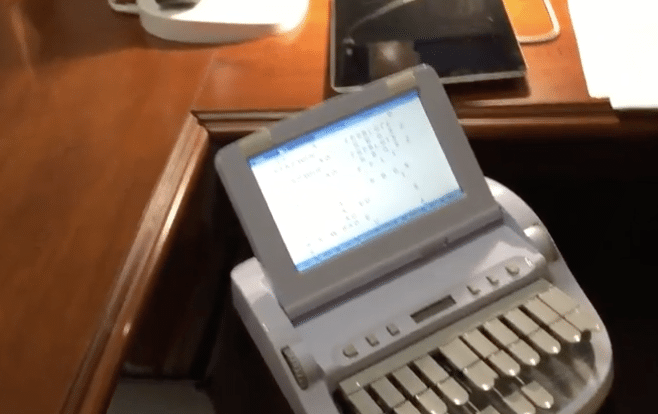 It was only a matter of time, but a fight is brewing in the court reporting industry over the acceptance and accuracy of digital court reporters. Now to be sure, nobody disagrees that there’s a critical shortage of court reporters in the United States. A recent report sponsored by the National Court Reporters Association (NCRA) stressed that the dwindling supply of court reporters would lead to a nearly 5,500 shortfall in those positions by 2018.
It was only a matter of time, but a fight is brewing in the court reporting industry over the acceptance and accuracy of digital court reporters. Now to be sure, nobody disagrees that there’s a critical shortage of court reporters in the United States. A recent report sponsored by the National Court Reporters Association (NCRA) stressed that the dwindling supply of court reporters would lead to a nearly 5,500 shortfall in those positions by 2018.
It is now 2020, and that shortfall hasn’t improved, but NCRA president Roy “Max” Curry Jr. said digital reporters aren’t the solution.
The association noted the integrity and accuracy of a digital court reporter’s transcript “completely depends on the audio quality,” and that the audio files used are “outsourced” for transcription, which jeopardizes sensitive information. What’s more, the NCRA alleged there’s no standard or certification for digital reporters.
Despite the hesitancy toward digital court reporting, the NCRA isn’t against leveraging technology to deploy the limited amount of court reporters to more court and deposition proceedings.
What Did Curry Say
In fact, Curry said the NCRA supports leveraging video conferencing technology for court reporters to transcribe various proceedings remotely in one location. Curry said the NCRA agrees with remote transcribing with video conferencing because, unlike digital court reporting, it doesn’t solely rely on a court reporter transcribing prerecorded audio.
“It’s just too risky to go down the road of this [electronic recording] stuff in regard to record integrity,” Curry said. He added, “When digital media is altered it would take a digital expert to confirm it.”
However, many advocates for digital court reporters say the NCRA’s claims are faulty and misguided.
What Did Others Have to Say
Janet Harris, co-founder and president of the American Association of Electronic Reporters and Transcribers (AAERT) co-wrote a response letter to the NCRA’s flyer taking issue with the NCRA’s claims that digital court reporters lack certification and standards.
She pointed to AAERT’s electronic court reporter and electronic transcriber programs, and the association’s best practices guide, as examples of the certification and ongoing guidance it provides digital court reporters.
Digital legal record-keeping advocate Speech-to-Text Institute, which was also a co-writer of the NCRA response letter, also took issue with some of NCRA’s accusations.
“They have no basis to say that digital reporting with an actual digital reporter monitoring the system that ensures accuracy can deliver anything a stenographer can’t do, except for perhaps real-time translation to see texts of proceedings,” said Jim Cudahy, executive director of Speech-to-Text Institute and the former executive director of NCRA.
Harris also noted the AAERT’s best practices guide includes making multiple copies of audio and storing archives with the court, as a safeguard. She said the NCRA’s flyer might signify a fear of the technological unknown.
Finding a resolution to the growing court reporter shortage has grabbed the legal and tech industry’s attention as it is well known to be a serious issue.
For its part, Curry said the NCRA isn’t against court reporters leveraging advanced technology. In fact, he predicts as AI’s accuracy improves it will play a larger part in court reporters’ work for the better.
CourtScribes.com supports all states and programs that aid in the court reporting world, and we too are ready to serve you in your court reporting, videography services, interpreters, live-streaming, and video-to-text synchronization.
Although the majority of cities that offer CourtScribes’ services are in Florida, the company home base, other cities all across these United States that CourtScribes offers services in, are the following: Jacksonville, Miami, Tampa, Port St. Lucie, Fort Lauderdale, Cape Coral, Coral Springs, Clearwater, Palm Bay, Fort Myers, Weston, Sarasota, Orlando, St. Petersburg, Hialeah, Stuart, Hollywood, Naples, West Palm Beach, Boca Raton, Deerfield Beach, Jupiter, Key West, Coral Gables, Maryland, Manhattan, Buffalo, Washington DC, Baltimore, Bowie, Virginia, Frederick, Albany, New York, Brooklyn, Westchester, Gaithersberg, and Rockville.

 Another state, another shortage in court reporting being mentioned on this site. This time out of Texas. All across Texas, a shortage of court reporters has caused a Cherokee County judge,
Another state, another shortage in court reporting being mentioned on this site. This time out of Texas. All across Texas, a shortage of court reporters has caused a Cherokee County judge, 
 The Illinois Official Court Reporters Association
The Illinois Official Court Reporters Association